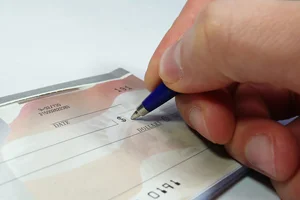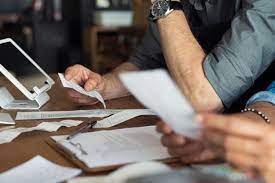Is check fraud a felony? This question often sparks concern among individuals navigating the complexities of financial law. This post will delve into the intricacies surrounding check fraud, examining its legal ramifications and the potential consequences individuals may face.
Yes, check fraud is typically considered a felony. It involves intentionally writing a check with the knowledge that there are insufficient funds in the account to cover it or altering a check with the intent to deceive.
The severity of the offense and potential penalties can vary depending on factors such as the amount of money involved and the jurisdiction in which the crime occurred. However, it’s generally viewed as a serious offense due to its fraudulent nature and potential financial harm to individuals or businesses.
“Hire a hacker to fight fraudster today”
Types of Check Fraud

Check fraud encompasses various illegal activities involving checks. Here are some common types:
- Forgery: This involves altering or creating a counterfeit check. It could be modifying the payee, the amount, or the signature on a legitimate check, or creating a fake check altogether.
- Counterfeit Checks: Criminals may produce fake checks using sophisticated printing equipment, often replicating the look and feel of legitimate checks from reputable institutions.
- Check Kiting: This scheme involves taking advantage of the time it takes for funds to clear between two different banks. The fraudster writes a check from one account with insufficient funds and deposits it into another account. They repeat this process, taking advantage of the time delay to access funds that don’t actually exist.
- Check Washing: Here, criminals alter the payee or the amount on a legitimate check using various chemicals or techniques to remove or modify the ink, allowing them to rewrite the check to themselves or for a larger amount.
- Paper Hanging: This involves writing a check on a closed or non-existent account, relying on the delay in processing to use the funds before the bank realizes the account is invalid.
- Account Takeover: Fraudsters gain unauthorized access to a legitimate bank account, either through hacking or obtaining account information, and then use the account to write fraudulent checks.
- Remote Deposit Capture Fraud: With the advent of remote check depositing through mobile apps, fraudsters exploit vulnerabilities in this system to deposit counterfeit checks remotely.
- Identity Theft: Criminals steal personal information, including bank account details, and use it to write fraudulent checks or open new accounts in the victim’s name.
These are just a few examples of the types of check fraud that occur. As technology evolves, so do the methods used by criminals, making it essential for individuals and businesses to stay vigilant and employ security measures to protect against check fraud.
Is check fraud a felony?
Yes, check fraud is typically considered a felony offense in many jurisdictions, especially if the amount involved exceeds a certain threshold or if it’s part of a larger criminal scheme. The severity of the offense and the potential penalties can vary depending on factors such as the amount of money involved, the intent of the perpetrator, and the specific laws of the jurisdiction.
Convictions for check fraud can result in significant legal consequences, including imprisonment, fines, restitution payments, probation, and a permanent criminal record. Additionally, individuals convicted of check fraud may face civil lawsuits from victims seeking to recover their losses.
Given the serious consequences associated with check fraud, it’s crucial for individuals and businesses to take proactive measures to prevent fraud, such as regularly monitoring financial accounts, implementing security features on checks, and educating employees about the risks and warning signs of fraudulent activity.
Methods and Techniques Employed by Fraudsters
Fraudsters employ a variety of methods and techniques to commit their crimes, often exploiting vulnerabilities in systems, human psychology, or technology. Here are some common strategies:
- Social Engineering: Fraudsters use manipulation and deception to trick individuals or employees of organizations into revealing sensitive information such as passwords, account numbers, or personal details. This can be done through phishing emails, phone calls impersonating legitimate entities, or even in-person interactions.
- Malware and Hacking: Cybercriminals use malicious software to gain unauthorized access to computers, networks, or systems. This can include keyloggers to capture keystrokes, phishing schemes to install malware, or exploiting software vulnerabilities to gain control of systems.
- Identity Theft: Fraudsters steal personal information such as social security numbers, birthdates, or financial data to impersonate individuals or create fake identities. This information can be used to open fraudulent accounts, apply for loans, or make unauthorized purchases.
- Card Skimming: Criminals install devices called skimmers on ATMs, gas pumps, or point-of-sale terminals to capture data from credit or debit cards used by unsuspecting individuals. This information is then used to create counterfeit cards or make unauthorized transactions.
- Phishing: Phishing involves sending fraudulent emails or messages that appear to be from legitimate sources, such as banks or government agencies, in order to trick recipients into revealing personal or financial information, clicking on malicious links, or downloading malware.
- Account Takeover: Fraudsters gain unauthorized access to individuals’ or businesses’ accounts by stealing login credentials through methods like phishing, brute-force attacks, or purchasing them on the dark web. Once they have access, they can steal funds, make unauthorized transactions, or commit other forms of fraud.
- Impersonation and Spoofing: Fraudsters impersonate legitimate entities or create fake websites, emails, or phone numbers to deceive victims into providing sensitive information or making payments to fraudulent accounts.
- Insider Threats: Employees or trusted individuals within an organization may abuse their access privileges to commit fraud, whether by stealing sensitive data, embezzling funds, or engaging in other illicit activities.
- Check Fraud: As mentioned earlier, check fraud encompasses various illegal activities involving checks, such as forgery, counterfeiting, check kiting, and check washing.
These methods are constantly evolving as fraudsters adapt to new security measures and technologies, highlighting the importance of ongoing vigilance and robust security practices to mitigate the risks of fraud.
Preventive Measures

Preventing check fraud requires a combination of proactive measures and ongoing vigilance. Here are some preventive measures individuals and businesses can take:
- Secure Check Handling: Ensure that all checks are stored securely in a designated area, such as a locked cabinet or safe. Limit access to authorized personnel only, and keep track of who has access to the checks.
- Watermarks and Security Features: Choose check stock that includes advanced security features like watermarks, microprinting, and security inks. These features make it more difficult for fraudsters to alter or counterfeit checks successfully.
- Check Stock Control: Maintain strict control over your check inventory. Keep a detailed record of the serial numbers of all check stock, and reconcile it regularly to identify any missing or stolen checks.
- Account Reconciliation: Regularly reconcile your bank statements with your accounting records. This involves comparing issued checks with cleared checks and identifying any discrepancies or unauthorized transactions.
- Positive Pay: Enroll in positive pay services offered by your bank. With positive pay, you provide your bank with a list of checks issued by your company. When checks are presented for payment, the bank matches them against this list, flagging any discrepancies for your review before payment is authorized.
- Employee Training: Provide comprehensive training to employees on check fraud risks and prevention strategies. Make sure they understand the importance of following secure check handling procedures and are aware of common fraud schemes.
- Dual Control Procedures: Implement dual control procedures for check issuance and approval. This means that multiple employees are involved in the check issuance process, with one employee responsible for creating the check and another responsible for reviewing and authorizing it.
- Signature Verification: Establish protocols for verifying signatures on checks, especially for large or unusual transactions. Train employees to recognize authorized signatories and to verify signatures against reference samples when necessary.
- Encryption and Secure Communication: Use encryption and secure communication channels, such as secure email or secure file transfer protocols, when transmitting sensitive financial information, including account numbers and check images, to prevent interception by unauthorized parties.
- Regular Software Updates and Security Patches: Keep your accounting software, operating systems, and antivirus programs up to date with the latest security patches and updates. Regularly review and apply software updates to mitigate vulnerabilities that could be exploited by fraudsters.
- Check Positive Pay: Enroll in check positive pay services offered by banks. This service matches checks presented for payment against a list of checks issued by your company. Any discrepancies are flagged for review before payment is authorized.
- Vendor and Supplier Verification: Before issuing payments to vendors or suppliers, verify their legitimacy through due diligence. Be cautious of any unexpected or irregular payment requests, and confirm the authenticity of new vendors before processing payments to them.
- Monitor Accounts: Regularly monitor bank accounts for any unauthorized transactions or suspicious activity. Set up alerts for unusual account activity, such as large withdrawals or deposits, to promptly identify and investigate potential fraud.
By implementing these preventive measures and maintaining a proactive approach to fraud prevention, individuals and businesses can significantly reduce the risk of falling victim to check fraud and other forms of financial fraud.
Consequences of check fraud
The consequences of check fraud can be severe, both legally and financially. Here are some of the potential consequences individuals and businesses may face:
- Legal Penalties: Check fraud is typically considered a criminal offense, and individuals convicted of check fraud may face serious legal consequences, including:
- Imprisonment: Depending on the severity of the offense and applicable laws, perpetrators of check fraud may face significant jail or prison sentences.
- Fines: Courts may impose substantial fines as part of the punishment for check fraud convictions.
- Probation: In some cases, individuals convicted of check fraud may be sentenced to probation, during which they must comply with certain conditions set by the court, such as restitution payments or community service.
- Financial Losses: Victims of check fraud, including individuals and businesses, may suffer significant financial losses as a result of fraudulent activities. These losses can include:
- Funds Stolen: Fraudulent checks may result in the theft of funds from individuals’ or businesses’ bank accounts.
- Fees and Charges: Victims of check fraud may incur additional fees and charges from banks or financial institutions, such as overdraft fees or returned check fees.
- Legal Expenses: Victims may also incur legal expenses associated with investigating and prosecuting check fraud cases, as well as recovering stolen funds through civil litigation.
- Reputational Damage: Being a victim of check fraud can damage an individual’s or business’s reputation and credibility. This can have long-term consequences, affecting relationships with banks, customers, suppliers, and other stakeholders.
- Credit Damage: If check fraud results in financial losses or unpaid debts, victims’ credit scores and creditworthiness may be negatively impacted, making it more difficult to secure loans, credit cards, or other financial products in the future.
- Civil Liability: Perpetrators of check fraud may face civil lawsuits from victims seeking to recover their losses. This can result in court-ordered restitution payments, which can be substantial depending on the amount of the fraud and any additional damages awarded by the court.
- Loss of Trust and Relationships: Victims of check fraud may experience a loss of trust and damaged relationships with banks, financial institutions, vendors, customers, and other parties affected by the fraud. Rebuilding trust and relationships can be challenging and may take time and effort.
The consequences of check fraud can be significant and far-reaching, affecting both individuals and businesses in various ways. It underscores the importance of implementing preventive measures and maintaining vigilant oversight of financial transactions to mitigate the risks of falling victim to check fraud.
Impact of check fraud

Check fraud can have a significant impact on both individuals and businesses, affecting various aspects of their lives and operations. Here’s how:
- Financial Impact: Check fraud can result in direct financial losses for individuals and businesses. Funds may be stolen from bank accounts through fraudulent check cashing or unauthorized transactions. Additionally, victims may incur fees and charges from banks or financial institutions, such as overdraft fees or returned check fees.
- Legal Consequences: Perpetrators of check fraud may face serious legal repercussions, including imprisonment, fines, and probation. Individuals and businesses involved in check fraud investigations may also incur legal expenses associated with prosecuting or defending against fraud charges.
- Reputation Damage: Being a victim of check fraud can damage an individual’s or business’s reputation and credibility. This can impact relationships with banks, customers, suppliers, and other stakeholders. Rebuilding trust and restoring reputation can be a challenging and time-consuming process.
- Credit Damage: Check fraud can negatively impact victims’ credit scores and creditworthiness. Unpaid debts resulting from fraudulent transactions can lead to derogatory marks on credit reports, making it difficult to secure loans, credit cards, or other financial products in the future.
- Operational Disruption: For businesses, check fraud can disrupt operations and financial stability. Dealing with the aftermath of fraud, such as investigating the incident, reconciling accounts, and implementing new security measures, can divert resources and attention away from core business activities.
- Emotional and Psychological Toll: Being a victim of check fraud can take an emotional and psychological toll on individuals and business owners. Feelings of stress, anxiety, and vulnerability are common, especially when dealing with the financial and legal aftermath of fraud.
- Long-term Effects: The effects of check fraud can extend beyond the immediate incident. Victims may continue to face financial and legal challenges, as well as ongoing concerns about their security and vulnerability to future fraud attempts.
The impact of check fraud can be far-reaching and multifaceted, affecting victims’ financial well-being, personal and professional relationships, and overall peace of mind. Preventive measures and prompt action following a fraud incident are crucial in mitigating the impact and preventing future occurrences.
Conclusion
Check fraud is indeed considered a felony in many jurisdictions due to its serious implications and potential financial harm inflicted upon individuals and institutions. The deliberate deception involved in altering or forging checks undermines the integrity of the banking system and is punishable by law.
Therefore, it’s crucial for individuals to understand the legal consequences associated with check fraud and to refrain from engaging in such criminal activities. Is check fraud a felony? Absolutely.
